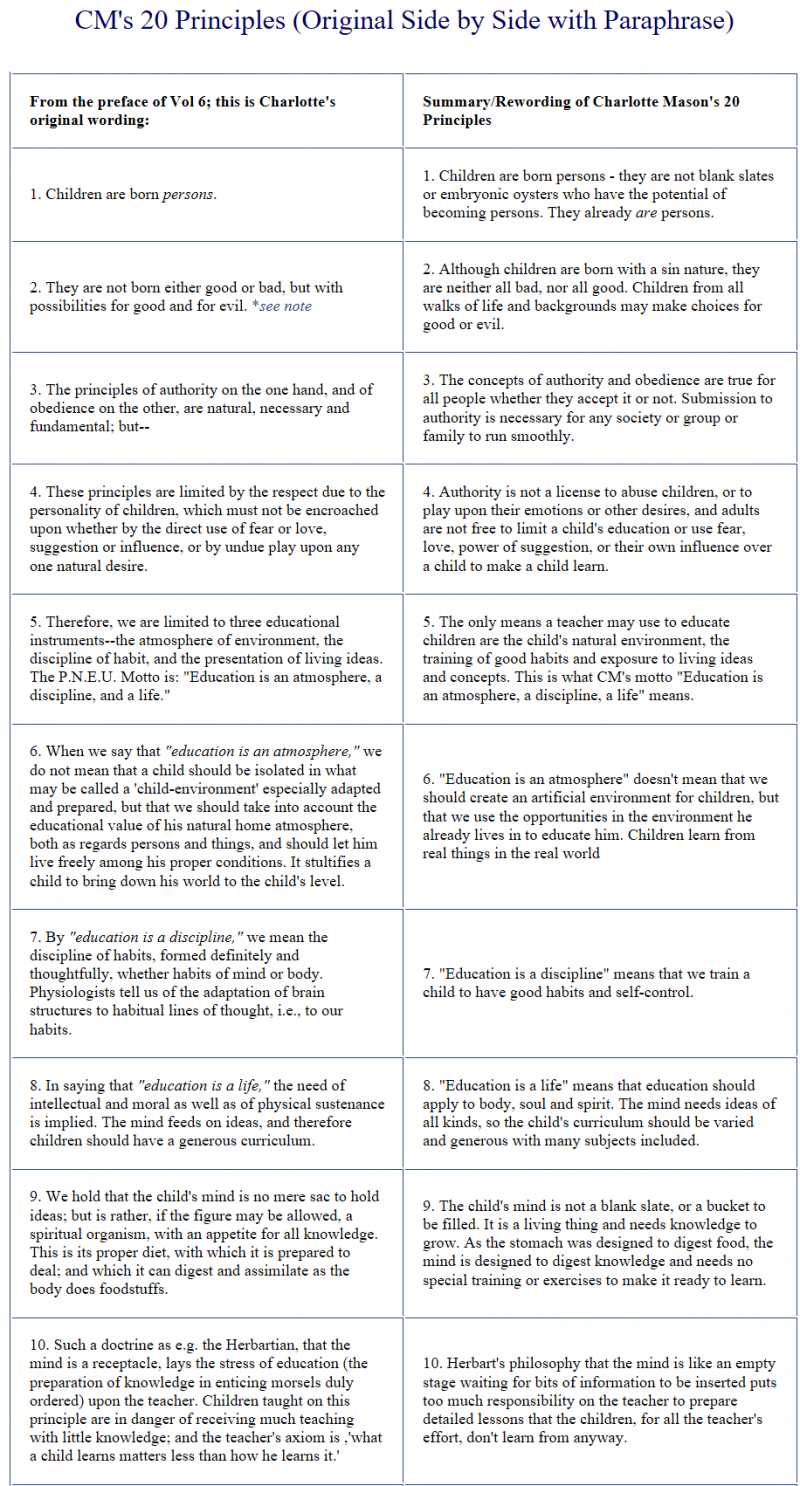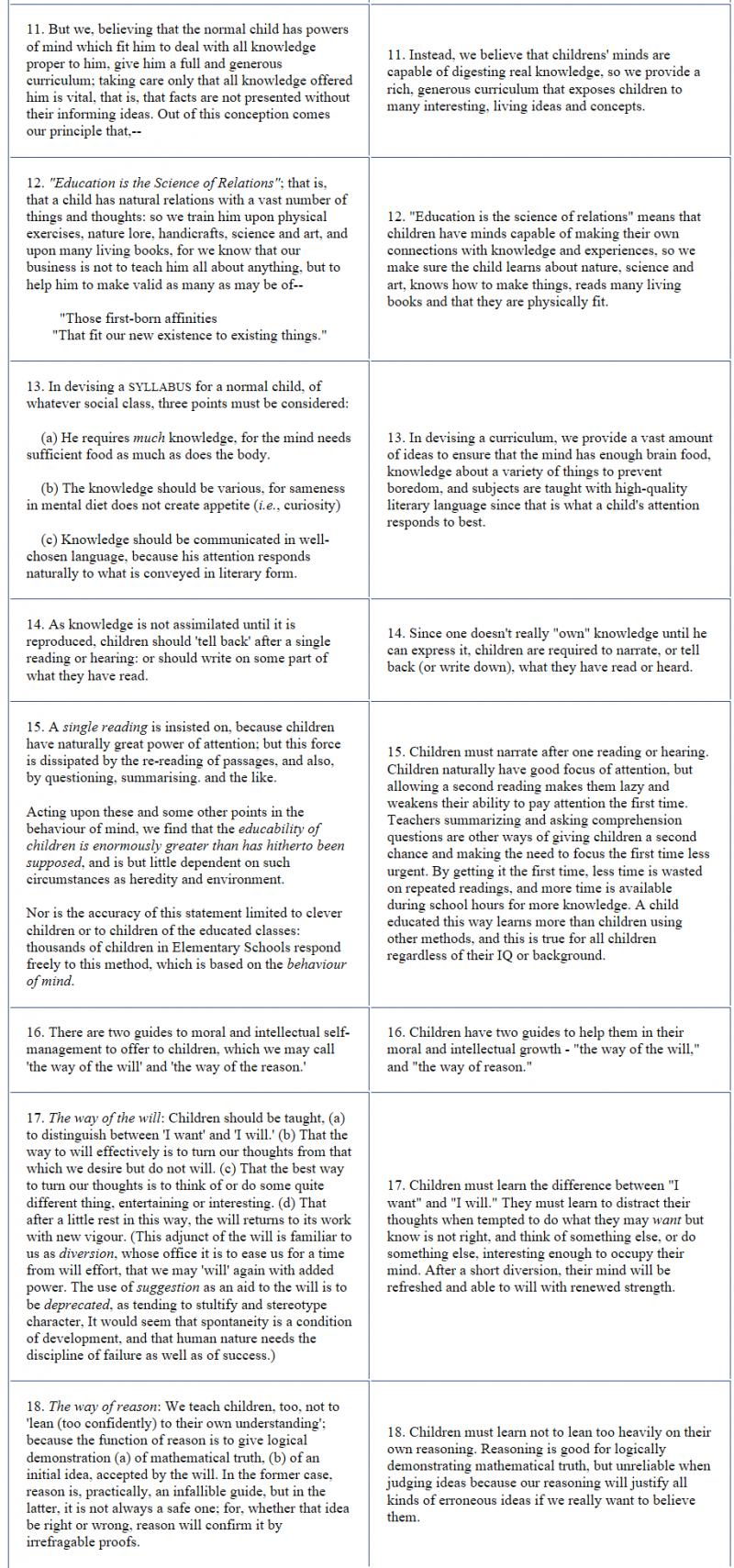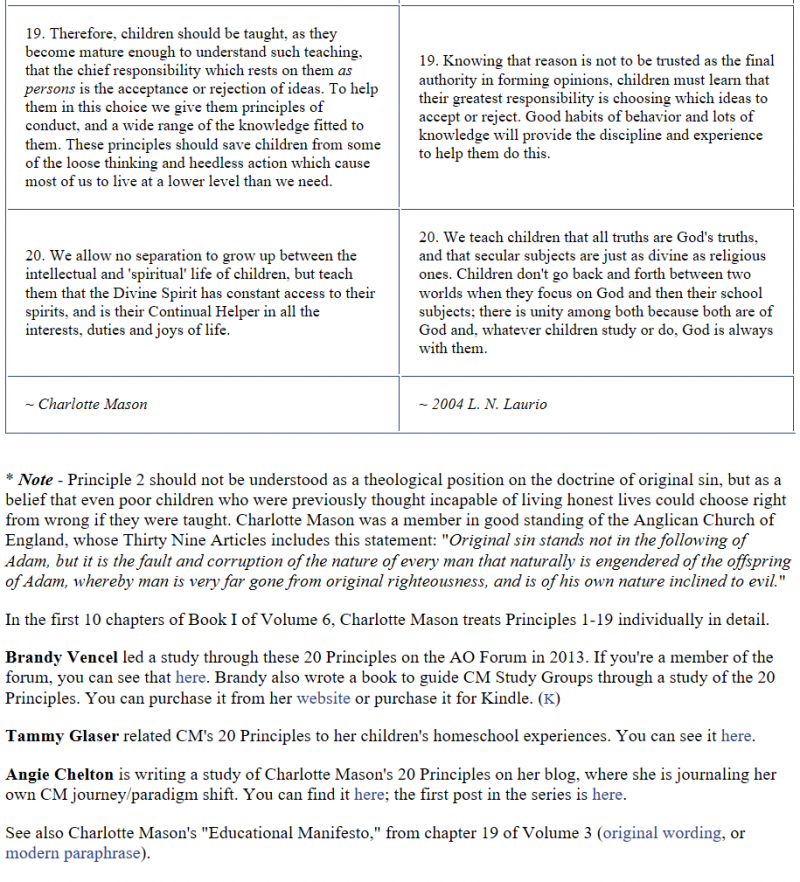[Charlotte Mason] CM's 20 Principles (Original Side by Side with Paraphrase)

-
10015회 연결
-
- 관련링크 : https://cafe.naver.com/cmled202451회 연결
- - 짧은주소 : https://edu2gether.com/bbs/?t=Q
본문
Charlotte Mason’s 20 Principles
“No sooner doth the truth. . .come into the soul’s sight, but the soul knows her to be her first and old acquaintance.”
“The consequence of truth is great; therefore the judgment of it must not be negligent.”
1. Children are born persons.
자녀들은 사람으로 태어납니다.(이하 한글번역: 송성수박사 by https://cafe.naver.com/cmled20)
2. They are not both either good or bad, but with possibilities for good and for evil.
자녀들은 선하게 태어나거나 악하게 태어나는 것이 아니라, 선을 택하거나 악을 택할 수많은 기회를 부여받은채 태어납니다.
3. The principles of authority on the one hand and of obedience on the other, are natural, necessary, and fundamental; but—
한편으로는 권위의 원리들과, 다른 한편으로는 순종의 원리들이 자연스럽고, 필요하고, 본질적이긴 하지만 -
4. These principles are limited by the respect due to the personality of children, which must not be encroached upon whether by the direct use of fear or love, suggestion or influence, or by undue play upon any one natural desire.
이러한 권위와 순종의 원리들은 자녀들을 인격으로 존중함으로서 제한받습니다.
그리고 자녀의 인견은, 인간의 본능적 욕구의 과도한 사용에 의해서든지, 또는 두려움과 사랑, 제안이나 영향력의 직접적 사용에 의해서든지 간에, 침해당해서는 안됩니다.
5. Therefore, we are limited to three educational instruments—the atmosphere of environment, the discipline of habit, and the presentation of living ideas. The P.N.E.U. Motto is: “Education is an atmosphere, a discipline, and a life.
따라서, 우리는 세 가지 교육도구들로 제한합니다.
이는 살아있는 사상의 제시와 습관의 훈련, 분위기의 조성입니다.
P.N.E.U.의 표어는 "교육은 분위기, 훈련, 생명이다"입니다.
6. When we say that “education is an atmosphere,” we do not mean that a child should be isolated in what may be called a ‘child-environment’ especially adapted and prepared, but that we should take into account the educational value of his natural home atmosphere, both as regards persons and things, and should let him live freely among his proper conditions. It stultifies a child to bring down his world to the child’s level.
"교육은 분위기이다"라고 말할 때, 특별하게 준비되거나 갖춰진 '자녀환경'이라 불릴 수 있는 곳으로 자녀가 격리되어야 함을 의미하지 않습니다. 가족과 환경 모두를 고려함으로써, 우리는 자녀의 자연스러운 가정 분위기에 대한 교육적 가치를 고려해야 합니다. 그리고 자녀가 적절한 조건 가운데서 자유롭게 살아가도록 해야할 것입니다.
7. By “education is a discipline,” we mean the discipline of habits, formed definitely and thoughtfully, whether habits of mind or body. Physiologists tell us of the adaptation of brain structures to habitual lines of thought, i.e., to our habits.
"교육은 일련의 훈련이다"라고 할 때, 몸의 습관이든지 또는 지성의 습관이든지 간에, 사려 깊고 확실하게 형성된, 습관들의 훈련을 의미합니다. 생리학자들은 우리에게 사고의 습관 방식(지도)에 따라 두뇌 구조가 적응한다고 말합니다. 다시말해, 우리의 습관에 따라 뇌 구조가 바뀐다는 것입니다.
8. In saying that “education is a life,” the need of intellectual and moral as well as of physical sustenance is implied. The mind feeds on ideas, and therefore children should have a generous curriculum.
9. We hold that the child’s mind is no mere sac to hold ideas; but is rather, if the figure may be allowed, a spiritual organism, with an appetite for all knowledge. This is its proper diet, with which it is prepared to deal; and which it can digest and assimilate as the body does foodstuffs.
10. Such a doctrine as e.g. the Herbartian, that the mind is a receptacle, lays the stress of education (the preparation of knowledge in enticing morsels duly ordered) upon the teacher. children taught on this principle are in danger of receiving much teaching with little knowledge; and the teacher’s axiom is, “what a child learns matters less than how he learns it.”
11. But we, believing that the normal child has powers of mind which fit him to deal with all knowledge proper to him, give him a full and generous curriculum; taking care only that all knowledge offered him is vital, that is, that facts are not presented without their informing ideas. Out of this conception comes our principle that,—
12. “Education is the Science of Relations”; that is, that a child has natural relations with a vast number of things and thoughts: so we train him upon physical exercises, nature lore, handicrafts, science and art, and upon many living books, for we know that our business is not to teach him all about anything, but to help him make valid as many as may be of— “Those first-born affinities that fit our new existence to existing things.
13. In devising syllabus for a normal child, of whatever social class, three points must be considered:
(a) He requires much knowledge, for the mind needs sufficient food as much as does the body.
(b) The knowledge should be various, for sameness in mental diet does not create appetite (i.e., curiosity)
(c) Knowledge should be communicated in well-chosen language, because his attention responds naturally to what is conveyed in literary form.
14. As knowledge is not assimilated until it is reproduced, children should ‘tell back’ after a single reading or hearing: or should write on some part of what they have read.
15. A single reading is insisted on, because children have naturally great power of attention; but this force is dissipated by the re-reading of passages, and also, by questioning, summarizing and the like.
Nor is the accuracy of this statement limited to clever children or to children of the educated classes: thousands of children in Elementary Schools respond freely to this method, which is based on the behavior of mind.
16. There are two guides to moral and intellectual self-management to offer to children, which we may call ‘the way of the will’ and ‘the way of the reason.’
17. The way of the will: Children should be taught, (a) to distinguish between ‘I want’ and ‘I will.’ (b) That the way to will effectively is to turn our thoughts from that which we desire but do not will. (c) That the best way to turn our thoughts is to think of or do some quite different thing, entertaining or interesting. (d) That after a little rest in this way, the will returns to its work with new vigor. (This adjunct of the will is familiar to us ad diversion, whose office it is to ease us for a time from will effort, that we may ‘will’ again with added power. The use of suggestion as an aid to the will is to be deprecated, as tending to stultify and stereotype character. It would seem that spontaneity is a condition of development, and that human nature needs the discipline of failure as well as success.)
18. The way of reason: We teach children too, not to ‘lean (too confidently) to their own understanding’; because the function of reason is to give logical demonstration (a) of mathematical truth, (b) of an initial idea, accepted by the will. In the former case, reason is, practically, an infallible guide, but in the latter, it is not always a safe one; for, whether that idea be right or wrong, reason will confirm it by irrefragable proofs.
19. Therefore, children should be taught, as they become mature enough to understand such teaching, that the chief responsibility which rest on them as persons is the acceptance or rejection of ideas. To help them in this choice we give them principles of conduct, and a wide range of the knowledge fitted to them. These principles should save children from some of the loose thinking and heedless action which cause most of us to live at a lower level than we need.
20. We allow no separation to grow up between the intellectual and ‘spiritual’ life of children, but teach them that the Divine Spirit has constant access to their spirits, and is their Continual Helper in all the interests, duties and joys of life.
From Philosophy of Education, Volume 6 of the Home Education Series






댓글목록 0